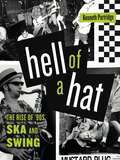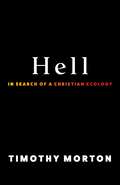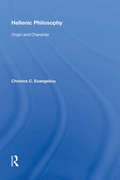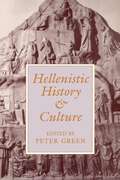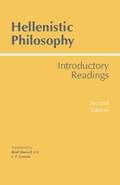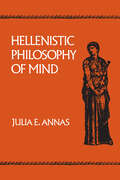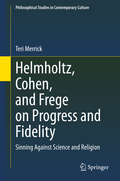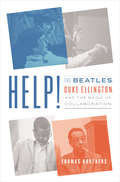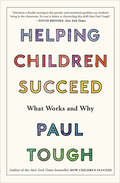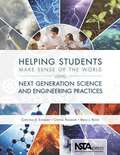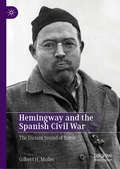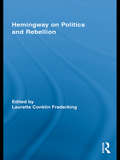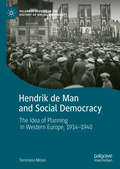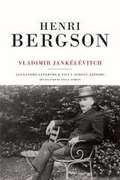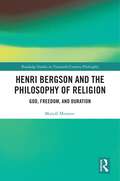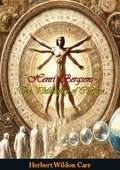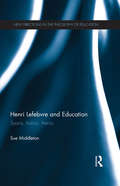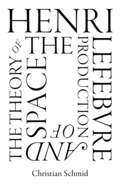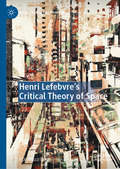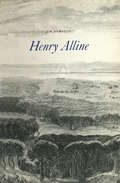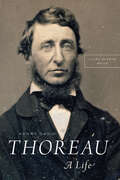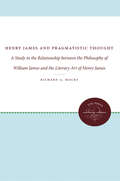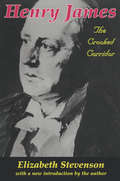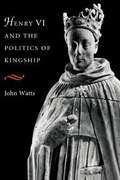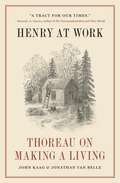- Table View
- List View
Hell of a Hat: The Rise of ’90s Ska and Swing (American Music History)
by Kenneth PartridgeIn the late ’90s, third-wave ska broke across the American alternative music scene like a tsunami. In sweaty clubs across the nation, kids danced themselves dehydrated to the peppy rhythms and punchy horns of bands like The Mighty Mighty Bosstones and Reel Big Fish. As ska caught fire, a swing revival brought even more sharp-dressed, brass-packing bands to national attention. Hell of a Hat dives deep into this unique musical moment. Prior to invading the Billboard charts and MTV, ska thrived from Orange County, California, to NYC, where Moon Ska Records had eager rude girls and boys snapping up every release. On the swing tip, retro pioneers like Royal Crown Revue had fans doing the jump, jive, and wail long before The Brian Setzer Orchestra resurrected the Louis Prima joint. Drawing on interviews with heavyweights like the Bosstones, Sublime, Less Than Jake, and Cherry Poppin' Daddies—as well as underground heroes like Mustard Plug, The Slackers, Hepcat, and The New Morty Show—Kenneth Partridge argues that the relative economic prosperity and general optimism of the late ’90s created the perfect environment for fast, danceable music that—with some notable exceptions—tended to avoid political commentary.An homage to a time when plaids and skankin’ were king and doing the jitterbug in your best suit was so money, Hell of a Hat is an inside look at ’90s ska, swing, and the loud noises of an era when America was dreaming and didn’t even know it.
Hell: In Search of a Christian Ecology
by Timothy MortonHell on earth is real. The toxic fusion of big oil, Evangelical Christianity, and white supremacy has ignited a worldwide inferno, more phantasmagoric than anything William Blake could dream up and more cataclysmic than we can fathom. Escaping global warming hell, this revelatory book shows, requires a radical, mystical marriage of Christianity and biology that awakens a future beyond white male savagery.Timothy Morton argues that there is an unexpected yet profound relationship between religion and ecology that can guide a planet-scale response to the climate crisis. Spiritual and mystical feelings have a deep resonance with ecological thinking, and together they provide the resources environmentalism desperately needs in this time of climate emergency. Morton finds solutions in a radical revaluation of Christianity, furnishing ecological politics with a language of mercy and forgiveness that draws from Christian traditions without bringing along their baggage. They call for a global environmental movement that fuses ecology and mysticism and puts race and gender front and center. This nonviolent resistance can stage an all-out assault on the ultimate Satanic mill: the concept of master and slave, manifesting today in white supremacy, patriarchy, and environmental destruction. Passionate, erudite, and playful, Hell takes readers on a full-color journey into the contemporary underworld—and offers a surprising vision of salvation.
Hellenic Philosophy: Origin and Character
by Christos C. EvangeliouTracing the historical origin and the critical development of Hellenic philosophy from vague and indeterminate beginnings to its classical maturity and fruition in the minds, words and works of the Athenian philosophers, Socrates, Plato, and Aristotle, this book argues that dignified nobility, respectful critique and unfettered freedom of thought and expression clearly defined the character of Classical Hellenic philosophy and that this distinguishes it from philosophies of different eras. Evangeliou examines the historical influence of Hellenic philosophy and its complex global relations to other non-Hellenic philosophies of Africa, Asia and Europe and also considers certain contemporary and sensitive issues, which relate to the nature of Western culture and European philosophy. Radical and revisionary in nature, this work challenges many of the long cherished myths about the influence of Classical Hellenic philosophy on the tradition of Western thought.
Hellenistic History and Culture (Hellenistic Culture and Society #9)
by Peter GreenIn a 1988 conference, American and British scholars unexpectedly discovered that their ideas were converging in ways that formed a new picture of the variegated Hellenistic mosaic. That picture emerges in these essays and eloquently displays the breadth of modern interest in the Hellenistic Age.A distrust of all ideologies has altered old views of ancient political structures, and feminism has also changed earlier assessments. The current emphasis on multiculturalism has consciously deemphasized the Western, Greco-Roman tradition, and Nubians, Bactrians, and other subject peoples of the time are receiving attention in their own right, not just as recipients of Greco-Roman culture.History, like Herakleitos' river, never stands still. These essays share a collective sense of discovery and a sparking of new ideas—they are a welcome beginning to the reexploration of a fascinatingly complex age.
Hellenistic Philosophy
by Brad Inwood Lloyd P. GersonThis new edition of Hellenistic Philosophy--including nearly 100 pages of additional materia--offers the first English translation of the account of Stoic ethics by Arius Didymus, substantial new sources on Epicureanism, Stoicism, and Scepticism, expanded representation of Plutarch and Cicero, and a fuller presentation of papyrological evidence. Inwood and Gerson maintain the standard of consistency and accuracy that distinguished their translations in the first edition, while regrouping some material into larger, more thematically connected passages.
Hellenistic Philosophy of Mind (Hellenistic Culture and Society #8)
by Julia E. AnnasHellenistic Philosophy of Mind is an elegant survey of Stoic and Epicurean ideas about the soul—an introduction to two ancient schools whose belief in the soul's physicality offer compelling parallels to modern approaches in the philosophy of mind. Annas incorporates recent thinking on Hellenistic philosophy of mind so lucidly and authoritatively that specialists and nonspecialists alike will find her book rewarding.In part, the Hellenistic epoch was a "scientific" period that broke with tradition in ways that have an affinity with the modern shift from the seventeenth and eighteenth centuries to the present day. Hellenistic philosophy of the soul, Annas argues, is in fact a philosophy of mind, especially in the treatment of such topics as perception, thought, and action.
Helmholtz, Cohen, and Frege on Progress and Fidelity: Sinning Against Science and Religion (Philosophical Studies in Contemporary Culture #27)
by Teri MerrickThis book examines the views of Hermann Helmholtz, Hermann Cohen and Gottlob Frege in reaction to the epistemic crises induced by rapid changes in 19th century scientific practice. Besides addressing longstanding interpretive puzzles of interest to Frege scholars, the book extracts precepts for rationally responding to paradigm shifts in scientific and religious traditions. Cohen’s work in particular is held up as an example of wisely navigating epistemic and hermeneutical crises in science and religion. The book will appeal to philosophers and historians of science or religion, especially to those concerned with the epistemic challenges posed by Kuhn’s The Structure of Scientific Revolutions.
Help!: The Beatles, Duke Ellington, And The Magic Of Collaboration
by Thomas BrothersThe fascinating story of how creative cooperation inspired two of the world’s most celebrated musical acts. The Beatles and Duke Ellington’s Orchestra stand as the two greatest examples of collaboration in music history. Ellington’s forte was not melody—his key partners were not lyricists but his fellow musicians. His strength was in arranging, in elevating the role of a featured soloist, in selecting titles: in packaging compositions. He was also very good at taking credit when the credit wasn’t solely his, as in the case of Mood Indigo, though he was ultimately responsible for the orchestration of what Duke University musicologist Thomas Brothers calls "one of his finest achievements." If Ellington was often reluctant to publicly acknowledge how essential collaboration was to the Ellington sound, the relationship between Lennon and McCartney was fluid from the start. Lennon and McCartney "wrote for each other as primary audience." Lennon’s preference for simpler music meant that it begged for enhancement and McCartney was only too happy to oblige, and while McCartney expanded the Beatles’ musical range, Lennon did "the same thing with lyrics." Through his fascinating examination of these two musical legends, Brothers delivers a portrait of the creative process at work, demonstrating that the cooperative method at the foundation of these two artist-groups was the primary reason for their unmatched musical success. While clarifying the historical record of who wrote what, with whom, and how, Brothers brings the past to life with a lifetime of musical knowledge that reverberates through every page, and analyses of songs from Lennon and McCartney’s Strawberry Fields Forever to Billy Strayhorn’s Chelsea Bridge. Help! describes in rich detail the music and mastery of two cultural leaders whose popularity has never dimmed, and the process of collaboration that allowed them to achieve an artistic vision greater than the sum of their parts.
Helping Children Succeed: What Works and Why
by Paul Tough“Research demonstrates that all children have the capacity for . . . success . . . Informative and effective methods to help children overcome issues and thrive.” —Kirkus ReviewsA NOW READ THIS PBS NewsHour and New York Times Book Review selectionIn the New York Times–bestselling How Children Succeed, Paul Tough introduced us to research showing that personal qualities like perseverance, self-control, and conscientiousness play a critical role in children’s success.Now, in Helping Children Succeed, Tough takes on a new set of pressing questions: What does growing up with economic and other stresses do to children’s mental and physical development? How does adversity at home affect their success in the classroom, from preschool to high school? And what practical steps can the adults who are responsible for them take to improve their chances for a positive future?Tough once again encourages us to think in a new way about the challenges of childhood. Mining the latest research in psychology and neuroscience, he provides us with insights and strategies for a new approach to childhood adversity, one designed to help many more children succeed.“Attention is finally turning to the psychic and emotional qualities our children bring to the classroom. No one is better than chronicling this shift than Paul Tough.” —David Brooks, New York Times “Tough convincingly argues that classroom climate is what needs changed in order to shape students’ experiences. . . . For readers concerned with finding practical ways to engage with and improve education for those children with the most to lose.” —Library Journal
Helping Students Make Sense of the World Using Next Generation Science and Engineering Practices
by Christina Schwarz Cynthia Passmore Brian ReiserWhen it’s time for a game change, you need a guide to the new rules. Helping Students Make Sense of the World Using Next Generation Science and Engineering Practices provides a play-by-play understanding of the practices strand of A Framework for K–12 Science Education (Framework) and the Next Generation Science Standards (NGSS). Written in clear, nontechnical language, this book provides a wealth of real-world examples to show you what’s different about practice-centered teaching and learning at all grade levels. The book addresses three important questions: <P><P>1. How will engaging students in science and engineering practices help improve science education? 2. What do the eight practices look like in the classroom? 3. How can educators engage students in practices to bring the NGSS to life? <P><P>Helping Students Make Sense of the World Using Next Generation Science and Engineering Practices was developed for K–12 science teachers, curriculum developers, teacher educators, and administrators. Many of its authors contributed to the Framework’s initial vision and tested their ideas in actual science classrooms. If you want a fresh game plan to help students work together to generate and revise knowledge—not just receive and repeat information—this book is for you.
Hemingway and the Spanish Civil War: The Distant Sound of Battle
by Gilbert H. MullerDuring the 1930s, no event was more absorbing or galvanizing to Ernest Hemingway than the Spanish Civil War. Hemingway was passionately devoted to the cause of the democratically elected Spanish Republic and he spent much of the war reporting from its front lines, producing a deeply political body of work that illuminated the conflict and presaged the world war to come. In the end, his immersive journey into the turbulent world of the Spanish Civil War resulted in For Whom the Bell Tolls, a landmark in American political fiction. This book offers a fresh account of Hemingway’s adventures in Spain during the Civil War, stressing his embrace of radical political action and discourse in defense of the Republic against the forces of Fascism. On the eightieth anniversary of For Whom the Bell Tolls, Gilbert H. Muller reconsiders Hemingway as an engaged artist, political actor, and visionary.
Hemingway on Politics and Rebellion (Routledge Studies in Social and Political Thought)
by Lauretta Conklin FrederkingHemingway has been labeled a ‘communist sympathizer,’ ‘elitist’, and a ‘rugged individualist.’ This volume embraces the complexity of political advocacy in Hemingway’s novels and short stories. Hemingway’s characters physically, intellectually and spiritually become part of resisting current conditions and affirm the value of resistance, even destruction, regardless of political outcome. Much more than political nihilism, rebellion allows man to realize the potentialities of his greatness as a leader, the realities of his solidarity as a comrade, and the simple sensations of everyday living. Hemingway draws new perspectives on the meaning of politics in our own lives at the same time as his writings affirm boundaries of political thought and literary theory for explaining many of the themes we study.
Hendrik de Man and Social Democracy: The Idea of Planning in Western Europe, 1914–1940 (Palgrave Studies in the History of Social Movements)
by Tommaso MilaniThe book investigates the intellectual and political trajectory of the Belgian theorist Hendrik de Man (1885-1953) by examining the impact that his works and activism had on Western European social democracy between the two world wars. Based on multinational archival research, the book highlights how the idea of economic planning became part of a wider effort to address an ideological crisis within the socialist movement and revitalise the latter amidst the Great Depression. A heavily controversial figure also because of his subsequent involvement in Belgian wartime collaboration, de Man played a pivotal role in challenging traditional Marxist assumptions about the role of the state under capitalism and in promoting transnational exchanges between unorthodox social democrats across Europe. Starting from de Man’s experience in World War I, the book analyses his departure from Marxism, his elaboration of an alternative social democratic paradigm, his entry in Belgian politics as well as the reception of his thought in France and Britain.
Henri Bergson
by Alexandre Lefebvre Nils F. Schott Vladimir JankélévitchAppearing here in English for the first time, Vladimir Jankélévitch's Henri Bergson is one of the two great commentaries written on Henri Bergson. Gilles Deleuze's Bergsonism renewed interest in the great French philosopher but failed to consider Bergson's experiential and religious perspectives. Here Jankélévitch covers all aspects of Bergson's thought, emphasizing the concepts of time and duration, memory, evolution, simplicity, love, and joy. A friend of Bergson's, Jankélévitch first published this book in 1931 and revised it in 1959 to treat Bergson's later works. This unabridged translation of the 1959 edition includes an editor's introduction, which contextualizes and outlines Jankélévitch's reading of Bergson, additional essays on Bergson by Jankélévitch, and Bergson's letters to Jankélévitch.
Henri Bergson and the Philosophy of Religion: God, Freedom, and Duration (Routledge Studies in Twentieth-Century Philosophy)
by Matyáš MoravecThis book connects the philosophy of Henri Bergson to contemporary debates in metaphysics and analytic philosophy of religion. More specifically, the book demonstrates how Bergson’s philosophy of time can respond to the problem of foreknowledge and free will. The question of how humans can be free if God knows everything has been a perennial issue of debate in analytic philosophy of religion. The solution to this problem relies heavily on what one thinks about time. The problem of time is central to Bergson’s philosophical system. In this book, the author offers a systematic application of Bergson’s thought to the freedom and foreknowledge problem. The first chapter presents a discussion of Bergson’s central concept of la durée (duration). The subsequent two chapters link la durée to the relation of time and space. Here the author provides a Bergsonian response to McTaggart’s argument for the unreality of time and develops a novel theory of time connected to Bergson’s analysis of temporal experience. The last three chapters explore the relation between free will, determinism, and divine foreknowledge. The author reconstructs Bergson’s theory of freedom and shows how it undermines the underlying dogmas of contemporary free-will theories. The author then argues that Bergson’s philosophy can be used to resolve the free will and foreknowledge problem in the philosophy of religion. The monograph concludes by opening avenues for new research into Bergson and analytic philosophy of religion, such as the philosophy of religious language, the relation between God and modality, religious experience, and religious pluralism. Henri Bergson and the Philosophy of Religion will be of interest to scholars and advanced students working on Bergson, 20th-century continental philosophy, philosophy of religion, and philosophy of time.
Henri Bergson: The Philosophy of Change
by Herbert Wildon CarrImmerse yourself in the revolutionary ideas of one of the most influential philosophers of the early 20th century with Herbert Wildon Carr's Henri Bergson: The Philosophy of Change. This illuminating work offers a comprehensive and accessible introduction to the thought of Henri Bergson, whose concepts of time, consciousness, and creativity have profoundly impacted modern philosophy.Herbert Wildon Carr, a respected philosopher and Bergson scholar, provides a detailed and insightful exploration of Bergson's philosophy. Henri Bergson: The Philosophy of Change delves into the core ideas that define Bergson's work, such as his distinction between clock time and lived time (durée), the nature of creative evolution, and the concept of élan vital (vital impulse).Carr expertly unpacks Bergson's complex theories, making them accessible to readers new to his work while offering deep insights for those already familiar with his philosophy. The book explores how Bergson's ideas challenge traditional mechanistic views of the universe, proposing instead a dynamic and fluid understanding of reality.Henri Bergson: The Philosophy of Change also examines Bergson's influence on a wide range of disciplines, from psychology and biology to literature and the arts. Carr discusses how Bergson's ideas have inspired and intersected with the work of other prominent thinkers and how his philosophy continues to resonate in contemporary debates about consciousness and the nature of time.Join Herbert Wildon Carr on a journey through the innovative and transformative philosophy of Henri Bergson, and discover how his ideas on change and creativity continue to inspire and challenge our perceptions of reality. Henri Bergson: The Philosophy of Change is a timeless exploration of one of philosophy's most dynamic thinkers.
Henri Lefebvre and Education: Space, history, theory (New Directions in the Philosophy of Education)
by Sue MiddletonDuring his lifetime Henri Lefebvre (1901-1991) was renowned in France as a philosopher, sociologist and activist. Although he published more than 70 books, few were available in English until The Production of Space was translated in 1991. While this work - often associated with geography - has influenced educational theory’s ‘spatial turn,’ educationalists have yet to consider Lefebvre’s work more broadly. This book engages in an educational reading of the selection of Lefebvre’s work that is available in English translation. After introducing Lefebvre’s life and works, the book experiments with his concepts and methods in a series of five ‘spatial histories’ of educational theories. In addition to The Production of Space, these studies develop themes from Lefebvre’s other translated works: Rhythmanalysis, The Explosion, the three volumes of Critique of Everyday Life and a range of his writings on cities, Marxism, technology and the bureaucratic state. In the course of these inquiries, Lefebvre’s own passionate interest in education is uncovered: his critiques of bureaucratised schooling and universities, the analytic concepts he devised to study educational phenomena, and his educational methods. Throughout the book Middleton demonstrates how Lefebvre’s conceptual and methodological tools can enhance the understanding of the spatiotemporal location of educational philosophy and theory. Bridging disciplinary divides, it will be key reading for researchers and academics studying the philosophy, sociology and history of education, as well as those working in fields beyond education including geography, history, cultural studies and sociology.
Henri Lefebvre and the Theory of the Production of Space
by Christian SchmidHenri Lefebvre&’s was the major theorist of space and of the urban. This is the definitive book on Lefebvre.This book presents an encompassing, detailed and thorough overview and reconstruction of Lefebvre&’s theory of space and of the urban.Henri Lefebvre belongs to the generation of the great French intellectuals and philosophers, together with his contemporaries Michel Foucault and Jean-Paul Sartre. His theory has experienced a remarkable revival over the last two decades, and is discussed and applied today in many disciplines in humanities and social sciences, particularly in urban studies, geography, urban sociology, urban anthropology, architecture and planning. Lefebvre, together with David Harvey, is one of the leading and most read theoreticians in these fields.This book explains in an accessible way the theoretical and epistemological context of this work in French philosophy and in the German dialectic (Hegel, Marx, and Nietzsche), and reconstructs in detail the historical development of its different elements. It also gives an overview on the receptions of Lefebvre and discusses a wide range of applications of this theory in many research fields, such as urban and regional development, urbanization, urbanity, social space, and everyday life.
Henri Lefebvre's Critical Theory of Space (Marx, Engels, and Marxisms)
by Francesco BiagiHenri Lefebvre's Critical Theory of Space offers a rigorous analysis and revival of Lefebvre’s works and the context in which he produced them. Biagi traces the historical-critical time-frame of Lefebvre's intellectual investigations, bringing to light a theoretical constellation in which historical methods intersect with philosophical and sociological issues: from Marxist political philosophy to the birth of urban sociology; from rural studies to urban and everyday life studies in the context of capitalism. Examining Lefebvre’s extended investigations into the urban sphere as well as highlighting his goal of developing a “general political theory of space” and of innovating Marxist thought, and clarifying the various (more or less accurate) meanings attributed to Lefebvre's concept of the “right to the city” (analysed in the context of the French and international sociological and philosophical-political debate), Henri Lefebvre's Critical Theory of Space ultimately brings the contours of Lefebvre’s innovative perspective—itself developed at the end of the “short twentieth century”—back into view in all its richness and complexity.
Henry Alline: 1748-1784
by J. M. BumstedTo Canadians of this century the name of Henry Alline is almost unknown. This biography introduces him to the general reader. Through the story of his life it also recreates the early settlement of the Maritime provinces, and examines the origins of one of the most dominant and continuing themes in Canadian life, evangelical pietism. Henry Alline emigrated from Rhode Island to Nova Scotia with his parents in 1760. Following his religious conversion during adolescence, he became an evangelical preacher and travelled throughout Nova Scotia spreading the gospel. But Alline was more than an itinerant preacher. Drawing on British (and indirectly on German) mythical writings, he rejected the tenets of Calvinism in favour of universal salvation and human free will. He emphasized Christian asceticism and mysticism. His writings, and his attempts to develop an intellectual rationale for his evangelical position, made him Canada's first metaphysical and mystical philosopher.In the history of early British settlement in Nova Scotia the name of Alline stands out because of his participation in the process and problems of settlement and his leadership during the trying times of the American Revolution. His career embodied a rejection of both the United States (by a rejection of Puritanism) and of Britain (by a rejection of church and state in Nova Scotia), and put Alline in a classic Nova Scotia position, neutrality, which could be justified by the importance of Christ and the relative unimportance of government. The years in which Alline lived were particularly critical ones for Canada, and his career both mirrors and dominates a period of pioneer hardships, political crises, and spiritual concern born of the uncertainties of human existence.
Henry David Thoreau: A Life (Science And Literature Ser.)
by Laura Dassow Walls“Walden. Yesterday I came here to live.” That entry from the journal of Henry David Thoreau, and the intellectual journey it began, would by themselves be enough to place Thoreau in the American pantheon. His attempt to “live deliberately” in a small woods at the edge of his hometown of Concord has been a touchstone for individualists and seekers since the publication of Walden in 1854. But there was much more to Thoreau than his brief experiment in living at Walden Pond. A member of the vibrant intellectual circle centered on his neighbor Ralph Waldo Emerson, he was also an ardent naturalist, a manual laborer and inventor, a radical political activist, and more. Many books have taken up various aspects of Thoreau’s character and achievements, but, as Laura Dassow Walls writes, “Thoreau has never been captured between covers; he was too quixotic, mischievous, many-sided.” Two hundred years after his birth, and two generations after the last full-scale biography, Walls restores Henry David Thoreau to us in all his profound, inspiring complexity. Walls traces the full arc of Thoreau’s life, from his early days in the intellectual hothouse of Concord, when the American experiment still felt fresh and precarious, and “America was a family affair, earned by one generation and about to pass to the next.” By the time he died in 1862, at only forty-four years of age, Thoreau had witnessed the transformation of his world from a community of farmers and artisans into a bustling, interconnected commercial nation. What did that portend for the contemplative individual and abundant, wild nature that Thoreau celebrated? Drawing on Thoreau’s copious writings, published and unpublished, Walls presents a Thoreau vigorously alive in all his quirks and contradictions: the young man shattered by the sudden death of his brother; the ambitious Harvard College student; the ecstatic visionary who closed Walden with an account of the regenerative power of the Cosmos. We meet the man whose belief in human freedom and the value of labor made him an uncompromising abolitionist; the solitary walker who found society in nature, but also found his own nature in the society of which he was a deeply interwoven part. And, running through it all, Thoreau the passionate naturalist, who, long before the age of environmentalism, saw tragedy for future generations in the human heedlessness around him. “The Thoreau I sought was not in any book, so I wrote this one,” says Walls. The result is a Thoreau unlike any seen since he walked the streets of Concord, a Thoreau for our time and all time.
Henry James and Pragmatistic Thought: A Study in the Relationship between the Philosophy of William James and the Literary Art of Henry James
by Richard A. HocksThis brilliant new study is the first comprehensive and penetrating exploration of the complex and important aesthetic and intellectual relationship between the Jameses. Hocks relates organically what William thought to how Henry thought, and his convincing argument becomes a profound examination of Henry's mind and the way in which his work dramatized a particular philosophical attitude through its unique and felicitous style.Originally published in 1974.A UNC Press Enduring Edition -- UNC Press Enduring Editions use the latest in digital technology to make available again books from our distinguished backlist that were previously out of print. These editions are published unaltered from the original, and are presented in affordable paperback formats, bringing readers both historical and cultural value.
Henry James: The Crooked Corridor
by Elizabeth StevensonCertain readers and critics have faulted Henry James for two contradictory reasons. He has been thought a writer limited in scope and depth in his treatment of a particular class of people. On the other hand, he has been thought to be too complex, too extreme in putting into difficult language his view of relationships between his chosen characters.Elizabeth Stevenson depicts Henry James as a stout and strong presence in the literature of the English language. From the relatively youthful, straightforward, and simple writing of his early years, to the involved complexities of his later stories, his significance cannot be denied. The barrier seems to have been a misunderstanding on the part of some. It is true nearly all of his characters are well clothed, well fed, and roofed comfortably. They are usually fairly well educated and talk literately and wittily. James rarely treats raw or wild nature, but he is sensitive to landscape as a background. He also does children well, and they are often outside the norms of society. Who is not touched by the uncanny in the tainted children of The Turn of the Screw, whether the taint is actually in the children or in the mind of the governess?In James, one may not travel physically a great deal, except to the resorts of those well-off financially and socially. One does travel extensively through the minds and hearts of his characters. The journey rewards the traveler. The delicacy of James' "melodramatic" insights causes tremor or appreciation from a reader. He describes the way life is, both horrible and wonderful. No one else has expressed this understanding in quite his way. Henry James: The Crooked Corridor will be of interest to students of American literature and general readers interested in biographies.
Henry VI And The Politics Of Kingship
by John WattsHenry VI (1422-61) was one of the most spectacularly inadequate kings of England, and his reign dissolved into the conflict known as the Wars of the Roses. Yet he held on to his throne for thirty-nine years and, for almost thirty of them, without much difficulty. What was the nature of Henry's inadequacy, and why did it have such ambivalent and complicated results? <P><P> This book looks intensively at the political system itself, rather than at individuals, their personalities and patronage networks, and thus offers the first truly structured narrative of the reign.<P> A paperback edition of the most detailed and original account of the reign of Henry VI to have appeared in many years.<P> Sheds light on the other reigns in later medieval England, during the period of the 'Wars of the Roses'.<P> Re-asserts the notoriously 'weak' king Henry VI in terms of constitutional aims and priorities.<P>
Henry at Work: Thoreau on Making a Living
by John Kaag Jonathan van BelleWhat Thoreau can teach us about working—why we do it, what it does to us, and how we can make it more meaningfulHenry at Work invites readers to rethink how we work today by exploring an aspect of Henry David Thoreau that has often been overlooked: Thoreau the worker. John Kaag and Jonathan van Belle overturn the popular misconception of Thoreau as a navel-gazing recluse who was scornful of work and other mundanities. In fact, Thoreau worked hard—surveying land, running his family&’s pencil-making business, writing, lecturing, and building his cabin at Walden Pond—and thought intensely about work in its many dimensions. And his ideas about work have much to teach us in an age of remote work and automation, when many people are reconsidering what kind of working lives they want to have.Through Thoreau, readers will discover a philosophy of work in the office, factory, lumber mill, and grocery store, and reflect on the rhythms of the workday, the joys and risks of resigning oneself to work, the dubious promises of labor-saving technology, and that most vital and eternal of philosophical questions, &“How much do I get paid?&” In ten chapters, including &“Manual Work,&” &“Machine Work,&” and &“Meaningless Work,&” this personal, urgent, practical, and compassionate book introduces readers to their new favorite coworker: Henry David Thoreau.
